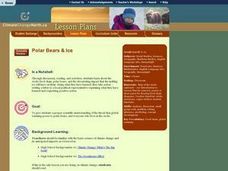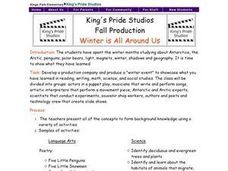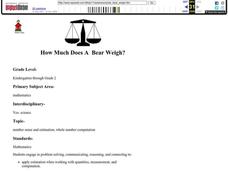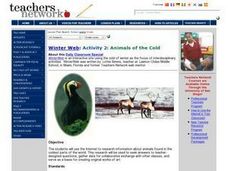National Wildlife Federation
I Speak for the Polar Bears!
Climate change and weather extremes impact every species, but this lesson focuses on how these changes effect polar bears. After learning about the animal, scholars create maps of snow-ice coverage and examine the yearly variability and...
Curated OER
Why Polar Bears Are White
Students are introduced to the concept of camouflage and protective coloration as well as Arctic animals. They examine how color can help animals in the wild. Students discuss where polar bears live and why they are white.
Curated OER
Polar Bear Literacy Activity
Students generate vocabulary words synonymous or related to "noise." In this literacy lesson, students listen to the book Polar Bear, Polar Bear, What do You Hear? by Bill Martin and Eric Carle and discuss the meaning of vocabulary words...
K5 Learning
All About Bears
Want to know all about bears? Read a passage about the way they look, how they live, and their lifestyles. The reading passage is followed by questions that ask what baby bears are called and in what ways some bears are different, to...
Curated OER
Polar Bear Drawing
In this coloring page worksheet, students study a black line drawing of a bear which appears to be a polar bear. Students color the picture.
Curated OER
Polar Bears and Ice
Students explore the Arctic food chain. They examine the needs of the polar bear and the threat that global warming poses to them. Students write a letter to a local political representative explaining what they have studied and...
Curated OER
March of the Polar Bears: Global Change, Sea Ice, and Wildlife Migration
Students study global change and how these changes impact wildlife. For this polar bears lesson students analyze maps and data to understand climate change.
Curated OER
Polar Bears
First graders explain what keeps Polar Bears warm in the Arctic by experiencing a layer of blubber to protect them. They read Little Polar Bear by Hans de Beer.
Curated OER
It Bears Repeating!!!
Learners research bears and their characteristics with a specific study on North American bears and polar bears. In this bear study lesson plan, students read books about polar bears and wild bears. Learners complete activities to...
Curated OER
Which Bear?
Students study bears. For this science lesson, students compare black, grizzly and polar bears. Students measure the bear tracks and compare the bear habitats and diet.
Curated OER
Global Warming
First graders discover the effects of global warming on polar bears. In this life science lesson, 1st graders model the polar bear's habitat and observe what happens as they raise the temperature. They record their observation in the...
Curated OER
Take Your Pick of "Beary" Fun Activities.
Students complete an integrated unit on bears. They read numerous books about bears, create a bear puppet, act-out stories, create a polar bear painting, participate in a Teddy Bear Picnic, and conduct a Teddy Bear parade.
Curated OER
Travel to the Polar Lands
Second graders receive an "Expedition Ticket" to travel through the Polar Regions- the Arctic and the Antarctic. They research polar bears and make drawings that are to scale.
Curated OER
Why are Polar Bears White
Students explore camouflage as they study polar bears and their habitat. They study how color can help animals in the wild.
Curated OER
Goldilocks and the Real Bears
Students participate in a comparison lesson where they compare fictional bears to real life bears. In this science/language arts lesson, students read Goldilocks and the Three Bears. Students observe characteristics of these fictional...
Curated OER
Call Me Bond, Hydrogen Bond
As amazing as James Bond is, the surface tension of water does not allow him to walk on it! In this series of little lab activities, physical scientists play with the properties of water due to the hydrogen bonds and resulting polarity....
Curated OER
OUR FAVORITE BEARS
Students state bear facts aloud, practice counting the nuber of bears aloud on the picture graph, read the picture graph and answer questions aloud about the data on the picture graph, and draw a picture of their favorite bear.
Curated OER
Winter is All Around Us
Students present what they have learned on Antartica. Students identify deciduous and evergreen trees and plants; identify and study about the habitats of animals that migrate, hibernate, and adapt; study the Aurora and Aurora Borealis...
Curated OER
How Much Does a Bear Weigh?
Learners estimate how many children in their class it would take to equal the mass of one adult bear. They then weigh and record their measurement on a chart to check their estimate.
Curated OER
Addition and Subtraction Snack Search
In this addition and subtraction instructional activity, learners solve 33 addition and subtraction problems where they circle the problems that are correct in order to draw paths for an elephant, a horse, and a polar bear to reach their...
Curated OER
Children's Literature Across the Curriculum Ideas-Polar, The Titanic Bear
Students read Polar, The Titanic Bear by Daisy Corning Stone Spedden. They complete a variety of cross-curricular activities surrounding this true story of a toy bear that survived the sinking of the Titanic. Included are reading, art,...
Curated OER
Animals of the Cold
Students access the Internet to research information about animals found in the coldest parts of the world. They gather data for collaborative exchange and research answers to teacher designed questions. They create original works of art...
World Wildlife Fund
Arctic Shapes
In a two-part activity, young geometers examine 3-D shapes and describe their attributes in a table. They will be able to draw the shape and name the number of vertices, faces, and edges. In the second part, individuals explore nets of...
Curated OER
Magic Tree House: Who Turned the Lights On?
In this literature response learning exercise, students draw a picture of the Northern Lights. This learning exercise is in response to the events in the Magic Tree House book, Who Turned the Lights On?

























